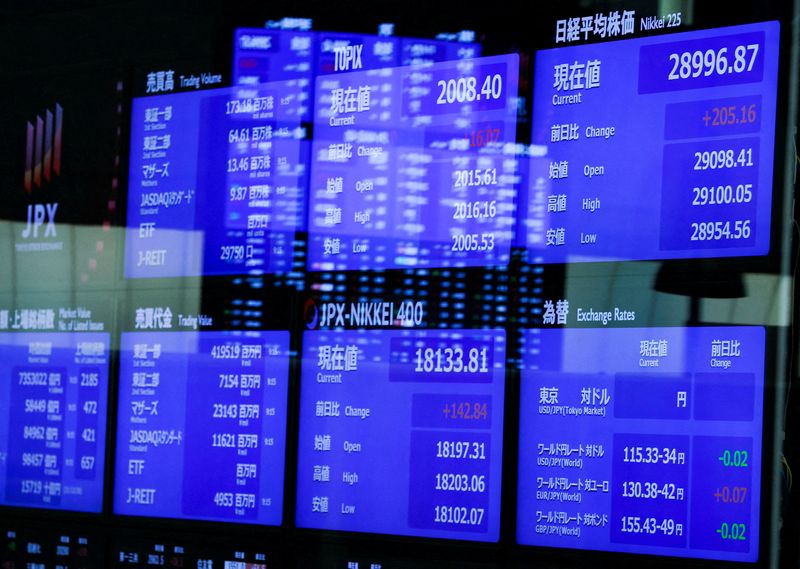
© Reuters. FILE PHOTO: Monitors displaying the stock index prices and Japanese yen exchange rate against the U.S. dollar are seen after the New Year ceremony marking the opening of trading in 2022 at the Tokyo Stock Exchange (TSE), amid the coronavirus disease (COVI
By Stella Qiu
SYDNEY (Reuters) – Asian shares edged higher on Tuesday, tracking a rebound on Wall Street ahead of a key U.S. inflation report, while the yen recouped losses against a sluggish dollar as Japan nominated a new central bank governor in a closely watched decision.
The bounce, however, is set to taper off in Europe, with the pan region remaining largely flat. Both and Nasdaq futures were off 0.1%.
In Asia, MSCI’s broadest index of Asia-Pacific shares outside Japan rebounded 0.3%. rose 0.6%.
Chinese shares wobbled, with the blue chips losing 0.4% and Hong Kong’s easing 0.2%.
In some positive news for markets, U.S. Secretary of State Antony Blinken is considering meeting top Chinese diplomat Wang Yi at the Munich Security Conference this week.
That marks a slight easing of tensions between the world’s two largest economies, after the United States shot down what it said was a Chinese spy balloon and other flying objects of unknown origin.
Later on Tuesday, the U.S. Bureau of Labor Statistics will release January’s consumer price index (CPI) data, which is expected to show how effective Federal Reserve policy tightening has been in taming inflation.
Analysts expect the headline CPI to rise 0.5% in January, with the core number seen advancing 0.4%, compared with 0.3% in the previous month, according to a Reuters poll. On an annual basis, consumer price inflation likely eased to 6.2%, from 6.5% in December.
Overnight on Wall Street, the rose 1.2%, while the Nasdaq rallied 1.5% and Dow Jones was up 1.1%.
“The bottom line for us is two-fold. First, inflation is coming down, but it will not be a smooth decline. A return to target for inflation was never very likely this year, so patience is required regardless,” said Seth Carpenter, chief global economist at Morgan Stanley (NYSE:).
“But second, the recent high wage inflation does not spell failure for the Fed. Services inflation is not too far off target, the link from wages to inflation is there, but small, and both services wage and price inflation are trending down despite a strong labour market,” Carpenter added.
Treasuries were largely steady, with the yield on benchmark 10-year government bonds easing 2 basis points at 3.6978%.
Two-year bond yields pulled further away from their three-month highs to hover at 4.5095%, compared with the previous close of 4.5340%.
In currency markets, the dollar remained subdued ahead of the inflation data, easing another 0.1%, after suffering a 0.3% loss against its major peers the last session.
In particular, it weakened 0.4% against the Japanese yen to 131.83 yen, after gaining 0.8% the previous day.
On Tuesday, the Japanese government named academic Kazuo Ueda as its pick for central bank governor, a surprise choice that could improve the odds of an end to its unpopular yield control policy.
Japan’s 10-year bond yields hovered at 0.5% – hitting the upper limit of a range enforced by the Bank of Japan – as investors bet the yield control policy would be wound up eventually under the new governor.
BlackRock (NYSE:) Investment Institute on Monday cut Japanese stocks to “underweight”, saying that a BOJ policy change away from its ultra-loose monetary strategy could push global yields higher and reduce risk appetite.
In the oil market, futures fell 0.7% to $86.01 while the U.S. West Texas Intermediate (WTI) crude also dropped 1.1% to $79.27.
Gold was 0.3% higher. traded at $1,858.91 per ounce.


Be the first to comment